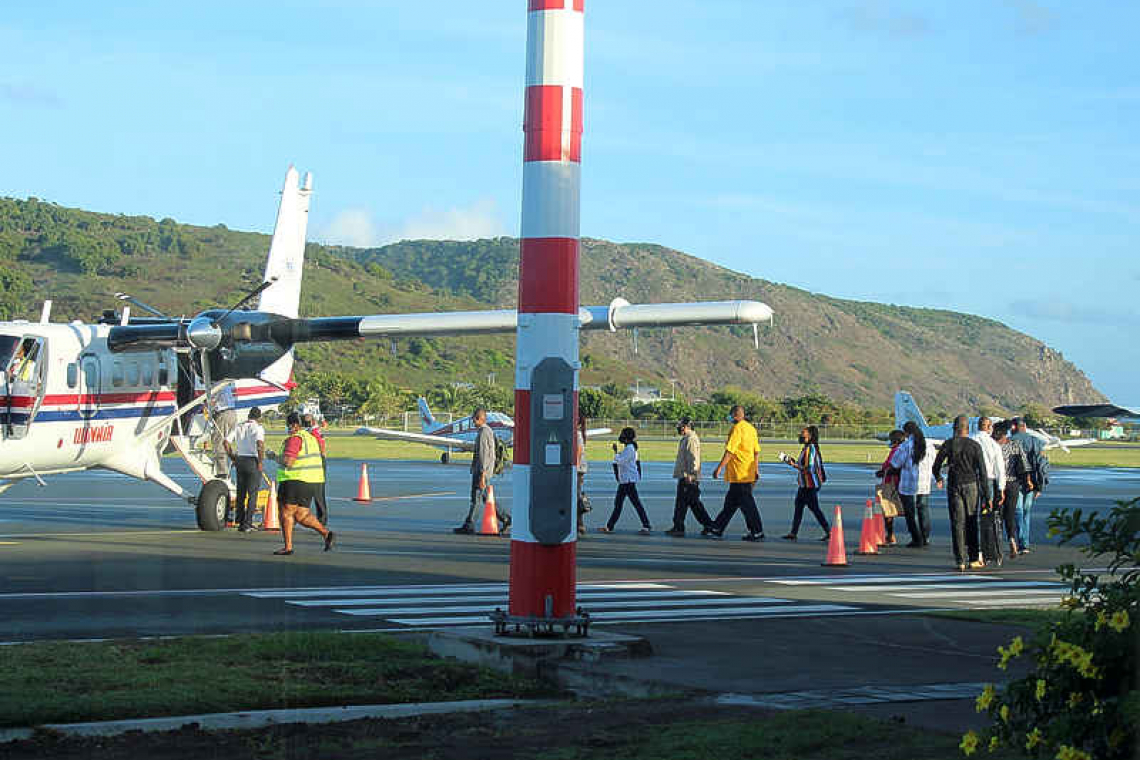Passengers boarding a Winair aircraft at F.D. Roosevelt Airport in St. Eustatius. (File photo)
ST. EUSTATIUS--The public entity St. Eustatius recently made some changes to its COVID-19 entrance policy. The changes went into effect as of Monday, January 25.
All persons are allowed to enter Statia based on normal immigration rules, but are required to register before entering the island by contacting email address
This email address is being protected from spambots. You need JavaScript enabled to view it.. This applies to persons entering Statia by sea vessel or aircraft.
The email message must include key details such as the date and reason of entry, name, nationality, date of birth, in what country or countries the person has stayed during the previous 14 days, and the location at which he or she wishes to stay during the quarantine period.
The request for entrance to Statia will need to be made and received at least 72 hours before the planned date of arrival, with approval to be expected within 48 hours after receiving the request. All travellers are required to undergo screening of health and travel history on their arrival.
Saba, Anguilla, St. Kitts and Nevis, China, Australia, Japan, Iceland, New Zealand, Rwanda, Singapore, Thailand and South Korea are considered low-risk countries. Travellers from low-risk countries do not have to undergo quarantine and will not have to present a negative COVID-19 polymerase chain reaction (PCR) test.
Aruba, Bonaire, Curaçao, St. Maarten and the Netherlands are designated as medium-risk. All other countries are considered high-risk. Persons travelling from medium- and high-risk countries are required to have a negative PCR test conducted within 72 hours before arrival. Another condition for high-risk countries is that a quick antigen test needs to be conducted within four hours before departure.
Persons from countries not belonging to the Dutch kingdom are required to have a negative quick antigen test four hours before departure from a high-risk country. If someone has a stopover of more than 24 hours the flights will be considered separate flights and the antigen test needs to be taken in the country of the long stopover within four hours before departure.
Medical patients returning on flights from Aruba, Bonaire, Curaçao and St. Maarten organised by health insurance office ZVK will be exempt from testing requirements.
Everyone entering Statia has to fill in a travel questionnaire which can be downloaded from the website of the public entity St. Eustatius. This form has to be filled in between 12 and 48 hours before arrival.
All persons entering from a high-risk country are required to go into quarantine in Statia on entry. Only persons who have been in a low-risk country for 14 consecutive calendar days, not including the day of travel, are exempted from quarantine.
If incoming passengers on a flight are from different risk categories, the public entity may decide to treat the passengers as being from the highest risk category present on the flight. The St. Eustatius Public Health Department can issue a quarantine obligation for every incoming person based on test results.
The quarantine period of 12 consecutive days does not include the day of travel. Travellers arriving from medium- and high-risk countries will have to undergo an exit PCR test on the 10th day of quarantine and will only be released from quarantine when a negative test result is received. This PCR test is executed and paid for by the Public Health Department.
Passengers from high-risk countries staying in Statia for 12 days or less will have to stay in quarantine for the entire duration of their stay. The government can give permission to conduct work during quarantine and has designed specific protocols that need to be signed by persons involved.
Statia residents are free to travel abroad without permission. However, they will not be entitled to any form of repatriation assistance and will have to pay for their own quarantine on their return under all circumstances. While traveling abroad people are responsible for obtaining permission to enter their country of destination themselves, the public entity stated.







